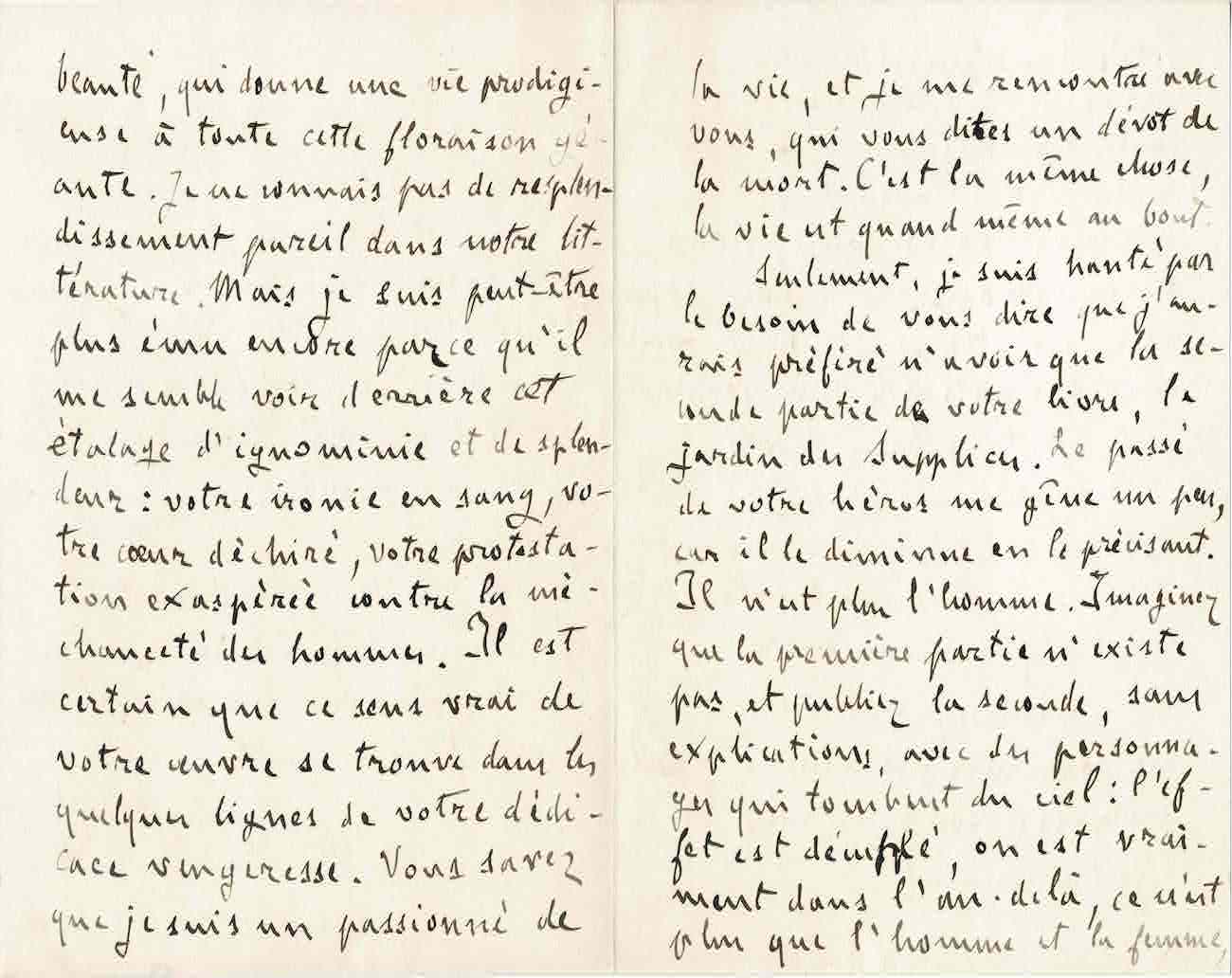Emile Zola (1840.1902)
Autograph letter signed “ Z ” to Octave Mirbeau
Four pages in-8°. [London]. June 1, 1899
“I am not talking to you about our victory (…) The brave people will finally rejoice. »
Superb letter from Zola, on the eve of his return from exile, congratulating his friend on his work Le Jardin des supplices and evoking the decision of the judges of the Court of Cassation in the Dreyfus Affair.
“My dear and great friend, I have finished reading The Garden of Torments, and although I hope to kiss you in five or six days, I do not want to wait to tell you all the pleasure of art, all the deep human emotion that you have just given me. I infinitely enjoy the dazzling and superb style pages, where you enumerate the shuddering horror of your tortures, where you speak of flowers as a lover, with a profusion of images, a passion for their beauty, which gives prodigious life to all this giant flowering. I do not know of such resplendence in our literature. But I am perhaps even more moved by what I seem to see behind this display of ignominy and splendor: your bloody irony, your torn heart, your exasperated protest against the wickedness of men. It is certain that this true meaning of your work is found in the few lines of your vengeful dedication. You know that I am passionate about life , and I meet you, who calls yourself a devotee of death. It's the same thing, life is still at the end. Only, I am haunted by the need to tell you that I would have preferred to have only the second part of your book, the garden of torture. Your hero's past bothers me a little, because he diminishes it by specifying it. He is no longer the man. Imagine that the first part does not exist, and publish the second, without explanations, with characters falling from the sky: the effect is increased tenfold, we are truly in the afterlife, it is nothing more than the man and woman, thrown into an embrace, into a spasm, to all the joys and all the pains of love, to total life. I'm probably not explaining myself well, we'll talk about it. And I send you, in the meantime, all my writer's heart, because you have written a very beautiful book. I'm not talking to you about our victory, we'll talk about it too. The good people will finally rejoice. Kiss your dear wife for me, as I kiss you yourself, very affectionately. Z.”
Octave Mirbeau published his novel Le Jardin des supplices at Charpentier Fasquelle in June 1899. A novel of “murder and blood ” in the words of its author, dedicated “ To the Priests, to the Soldiers, to the Judges, to the Men, who educate, direct , govern men, these pages of Murder and Blood ", the work aroused numerous reactions by the violence of its images and the power of its exoticism.
Attacked for defamation following the publication of his " J'accuse ", Zola was sentenced, in the summer of 1898, to a year in prison and a fine of 3,000 francs, the maximum penalty. Despite the cassation appeal, and on the advice of his lawyer Labori, the convicted Zola immediately left France to go into exile in England, before the verdict was officially notified to him and became enforceable. On July 18, 1898, Zola, alone, took the 9:00 p.m. train for Calais, without any luggage. Recluse in London, he remained attentive to the evolution of the procedure until his return to France on June 4, 1899.
Relations between Mirbeau and Zola oscillated for a quarter of a century between contempt and veneration. It was the Dreyfus affair which definitively reconciled the two men. United and driven by their hatred of injustice, they take up the cause of the innocent.
When the fight becomes more heated and Zola's life is threatened, Mirbeau resolutely places himself at the side of the "dear man". For this, he wrote, petitioned, acted as bodyguard when Zola had to go to court under the hostile cries of the anti-Dreyfusards, and went so far as to support him financially. On August 8, Mirbeau, to avoid the seizure of Zola's property, went to Versailles to pay, out of his own pocket, to the collector of Seine-et-Oise, the 7,525 francs to which Zola had been ordered to pay. At the beginning of 1899, he also went to England to morally support the exiled man, without ever forgetting, in France, to take care of Alexandrine, his wife.
Zola's death on September 29, 1902 did not interrupt this friendship. Beyond death, Mirbeau continues to pay homage to the author of J'accuse : he sets up, within a committee, the pilgrimage to Médan.






